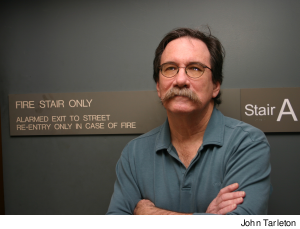On an average day of classes at Baruch College the Newman Library Building is a beehive of activity, as students pass through its revolving doors and fan out across five floors to study, do research or take a nap. The building also holds a large computer lab, a conference room and the bursar’s and registrar’s offices – but it has no working fire alarms.
Glenn Petersen, a professor of anthropology, says that makes him nervous. “Having a functioning fire alarm should be an incredibly high priority in a building that is so densely populated,” said Petersen, who is on the executive committee of Baruch’s PSC chapter. “When it’s exam time, you can’t even move in this place.”
 |
Since October
The Newman Library Building has not had a working fire alarm system since last October, and college officials have given little indication of when that might change. While the building’s sprinkler system is still functional, the lack of a working alarm system could make it more difficult to effectively evacuate the building in an emergency.
The nine-story building at 151 East 25th Street was originally built in 1895 to serve as a power station for the Lexington Avenue trolley line. Petersen noted that the building is only a mile away from the site of the infamous 1911 Triangle Shirtwaist Fire.
According to a March 21 statement from the college’s Office of Environmental Health and Safety, the pull stations and smoke detectors can no longer activate the fire alarm control panel located in the first-floor Public Safety Office. When operating properly, the system is designed to respond to fire by automatically initiating a building-wide alarm and strobe alert, providing public announcements to to direct evacuation, notifying the Fire Department, and alerting responders to the location of the problem.
The broken fire alarm system was first brought to the union’s attention at an October chapter meeting by two HEOs who were concerned that it was not being fixed, said PSC Chapter Chair Peter Hitchcock, who raised the issue at a labor-management meeting. With the problem still unresolved, the two HEOs returned to an early February chapter meeting and reiterated their concerns.
Notifying Workers
Security officials at Baruch and CUNY Central tried to assure union activists that the problem was under control. In lieu of a working fire alarm system, Baruch has had fire guard patrols walking through the building 24 hours a day.
Using fire guards is permitted as an alternative under city ordinances when a building does not have a working fire alarm system. But Charles Jennings, professor of fire science at John Jay College, says that fire guards are less effective than a fire alarm system, because a fire guard can only be in one place at a time, has to take breaks, and is subject to human error.
Use of human patrols “should always be a temporary measure until a proper fire alarm system is installed,” Jennings told Clarion, adding that “six months is a long time.”
Jennings said the potential danger posed by the lack of an alarm system is reduced by the fact that the Newman Library Building does have a fire suppressant system that utilizes heat-sensitive water sprinklers. “It’s a big mitigator,” he said. But, he noted, “It’s a problematic situation, because of the lack of a fire alarm system.”
Petersen was especially upset when he learned that the administration had not notified people who worked in the building about the lack of a working fire alarm system. Since a fire guard can’t be everywhere at once, awareness among employees and students is particularly important said Jennings. He noted that people tend to discount unusual smells out of deference to a fire alarm system.
Petersen, who chairs the department of sociology and anthropology, voiced his concerns at a March 7 meeting of the Baruch Faculty Senate at which Baruch President Mitchel Wallerstein was present. He said his colleagues were shocked by the news and that President Wallerstein promised an e-mail announcement, which was sent out on March 21.
The March 21 statement, from Baruch’s Office of Environmental Health and Safety, said that the project to replace the fire alarm system will be managed by CUNY and the Dormitory Authority of the State of New York (DASNY) and “is being given the highest priority.”
But with no time frame given, and a hefty price tag for repairs, there’s been little progress to date.
Elsewhere at CUNY?
PSC members at Bronx Community College also report problems with fire safety. According to union activist Leslie deGiere, half of Colston Hall has a visible fire alarm with strobe lights but no sirens while the other half has working sirens but no strobe lights. Inaudible fire alarms are also a problem in the basement classrooms at Meister Hall, said Sharon Utakis, an English professor who teaches an ESL class in one of those rooms.
“It doesn’t make me feel safe,” she told Clarion. “I’m responsible for my students. If there’s a fire and I don’t know about it, my students are in danger.”
If you are concerned about a problem with fire safety on your campus, contact the PSC Environmental Health & Safety Watchdogs at 212-354-1252 or [email protected].

